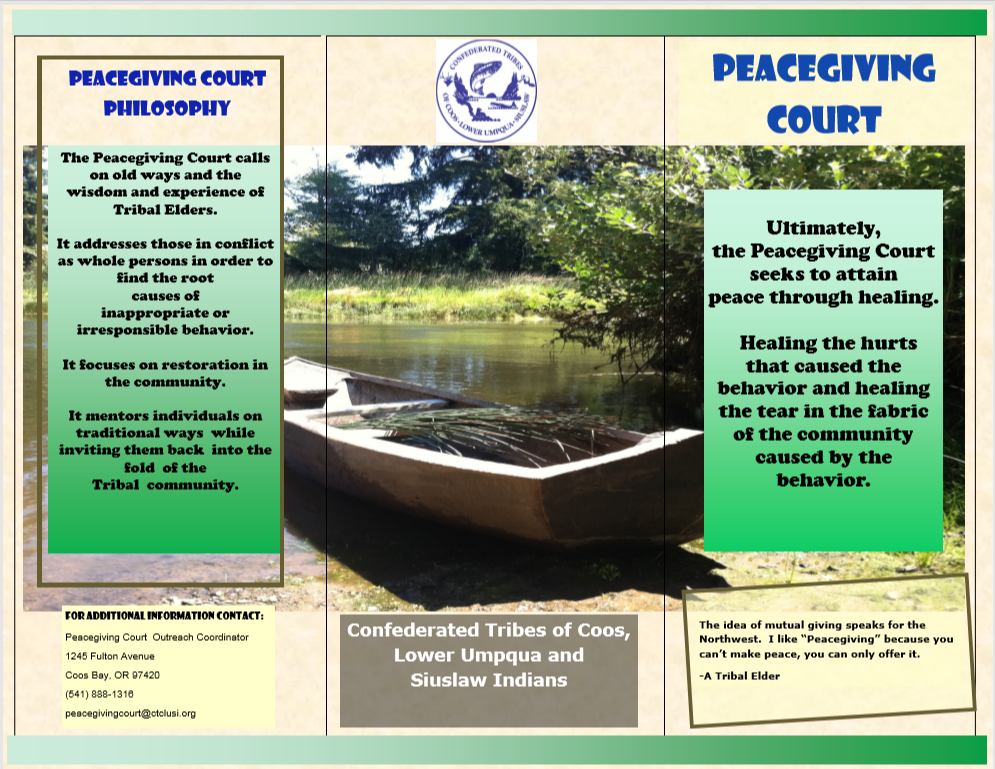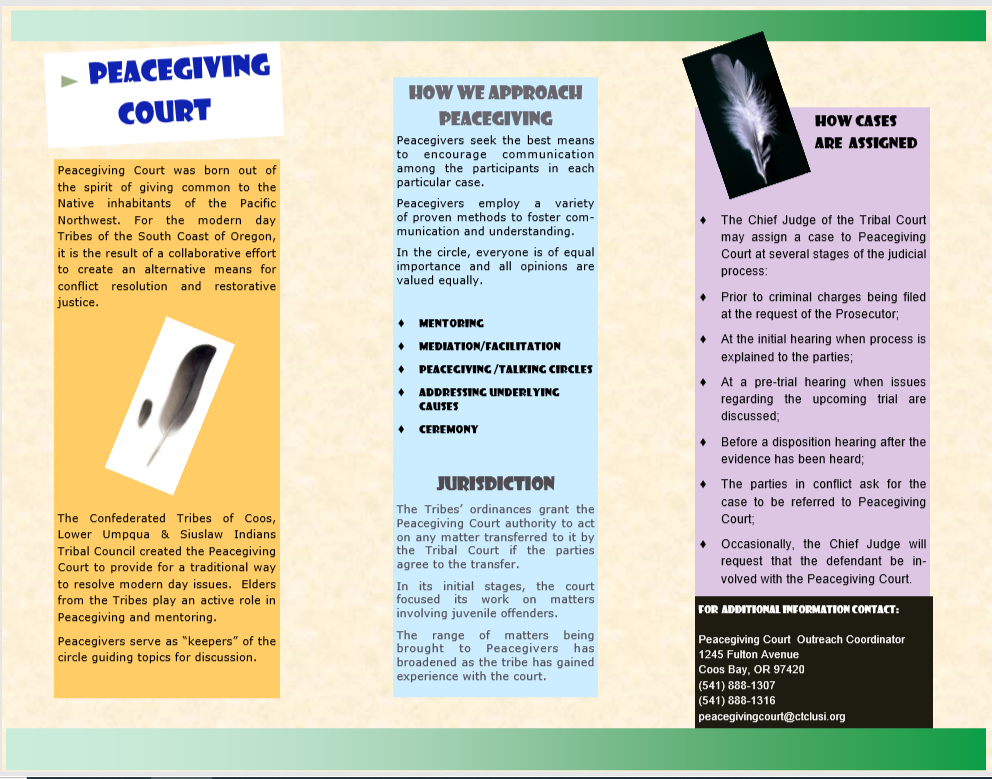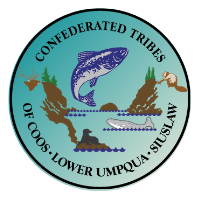Tribal Court Hours: 8 a.m.-12p.m. Monday through Friday
Tribal Court & Peacegiving
Benefits and Goals of Tribal Court
Benefits: Exercise of the Tribes’ sovereignty providing for resolution of conflicts within the tribal court.
Goals: Tribal court will be user friendly; various forms are available from the court clerk and on-line. Alternative forms of resolution are planned; costs will not be prohibitive.
GENERAL TRIBAL COURT JURISDICTION
Adoptions
Arbitration
Civil Actions
Civil Cases
Civil Rights
Collections
Contract Disputes
Court of Appeals
Domestic Violence
Election Disputes
Enrollment Appeals
Eviction
Juvenile
Offenses
Peacegiving
Small Claims
Tort Claims (Personal Injury and Property Damage)
Peacegiving will provide a voluntary dispute resolution alternative, grounded in the tribal traditions of peace and healing.
Purpose
The Tribal Council of the Confederated Tribes of Coos, Lower Umpqua, and Siuslaw Indians created Peacegiving on November 13, 2005, by Tribal Council Resolution 05-111. The purpose of Peacegiving is to protect the health and welfare of Tribal members by utilizing Tribal customs and traditions to resolve conflicts and to assist Tribal youth in need of services. It is grounded in Tribal traditions of peace and healing.
Peacegiving is a division of the Tribal Court and is subject to the supervision and control of the Chief Judge. Peacegiving is facilitated by Peacegivers – who are Tribal members who have the respect of the Tribal community and a reputation for honesty, integrity, humanity and a demonstrated practice for resolving local problems by means that honor Tribal values of peace and healing.
Objective
Peacegiving is a significant alternative to the criminal justice system and serves as a model to other communities and Tribal Courts for restorative justice. Any type of dispute can be referred to Peacegiving by using the “Notice of Dispute and Request for Transfer of Dispute to Peacegiving” form.
Statistics
The first Peacegiving case was filed in 2005 and since then, there have been over 20 Peacegiving cases referred to Peacegiving.
Philosophy and Cost Benefit
Statistically, the numbers are small, however, the ripple effect on the life of the youth, their family and their Tribal community are huge. Success stories include Tribal youths who are now college graduates and gainfully employed, been awarded scholarships and others who have turned their lives around so they do not enter the State Court System, which would have “followed” them through life.
Peacegiving is an investment in the members of the Tribes by providing for a cultural response to conflict.
According to a 2009 study by the State of Oregon’s Criminal Justice Commission, the benefit to a property crime victim for avoiding a conviction is $25,550. The benefit to the State of Oregon for avoiding prosecution is $36,105.
Peacegiving works to benefit all parties.


The CTCLUSI Wellness Court serves Tribal Members who are involved in legal or administrative disciplinary proceedings who may also struggle with substance abuse. Such persons may access the CTCLUSI Wellness Court by several difference avenues, including but not limited to self-referral, CTCLUSI Police citation, CTCLUSI Family Services, family service departments of other jurisdictions (state and tribal), on the CTCLUSI Tribe’s Motion or Petition, referral from the CTCLUSI Education and Housing Departments, collaboration with state court systems, and referral from state and/or tribal probation or community corrections departments.
Each Wellness Court case is managed by a team, which includes the Wellness Court Judge, the Wellness Court Case Manager, treatment providers, a CTCLUSI Police Officer, a Tribal Elder, the Tribal Presenting Officer, and the Tribal Defense Advocate. Additional team members may be included, depending on the participant’s needs. The Wellness Court Team works together to guide the progress of the participant in his or her recovery process, to provide support in areas where there may be personal or historic barriers, such as education, employment, and community and family life. The Wellness Court Team works in collaboration with the participant to hold the participant accountable to treatment goals and resolve the underlying legal matter, while providing culturally appropriate support tailored to address the specific needs of each individual.
Please bring your questions to the attention of Jennifer Stephens, the Wellness Court Case manager. She may be reached at the Tribal Court Office in Coos Bay in person, by phone at 541-888-1307 or Cell 541-808-8425, or by email at jstephens@ctclusi.org.
Any CTLCUSI Tribal Member, family member of a Tribal Member, or member of any other federally recognized Indian tribe may be eligible for participation in the CTCLUSI Wellness Court. If you know someone who is struggling with substance and having legal or administrative problems, you may use the form at the top of this webpage to refer them for consideration in this program.
Tribal Code 10-16-02 states that: The jurisdiction of the Court of Appeals shall extend to all appeals from final orders and judgments of the Tribal Court (Court), and appeals of final administrative decisions where a provision of this Code expressly vests such jurisdiction in the Court of Appeals. The Court of Appeals shall review de novo all determinations of the Tribal Court on matters of law, but shall not set aside any factual determinations of the Tribal Court if such determinations are supported by substantial evidence.
The Court of Appeals shall have jurisdiction:
(a)to take all necessary steps to preserve and protect the jurisdiction of the Court;
(b) during the pendency of any criminal appeal, to release the appellant on his own recognizance or on bail; and
(c) to make any order appropriate to preserve the status quo or to protect any ultimate judgment of the Court of Appeals.
1-16-10 COURT OF APPEALS JUDGES
1-16-11 Composition of Court of Appeals
The Tribal Council shall appoint a Chief Justice and two (2) Associate Justices to the Court of Appeals, none of whom shall be judges of the Tribal Court. The Judges empaneled for the Court of Appeals are:
- Chief Justice Robert T. Anderson
- Associate Justice Eric D. Eberhard
- Associate Justice Michael Taylor
COURT LOCATION: Tribal Court and Peacegiving is held at the Tribal Government Building of The Confederated Tribes of Coos, Lower Umpqua and Suislaw Indians, located at 1245 Fulton Avenue., Coos Bay, OR. Confirmation of court schedules can be made by speaking with the court clerk at 541-888-1306.
The court clerk’s office is located at 1245 Fulton Avenue, Coos Bay, OR. Office hours are posted. Call 541-888-9577 to determine staff availability.
- Dates are set each month so those cited by police have a scheduled appearance date.
- Other court dates will be set on an individual basis as needed.
Stephanie Nord
Tribal Court Clerk
541-888-1316 (Main) snord@ctclusi.org 1245 Fulton Avenue Coos Bay, Oregon 97420
Diane Whitson
Tribal Court Administrator
541-888-1306 (Main) dwhitson@ctclusi.org 1245 Fulton Avenue Coos Bay, Oregon 97420
Jennifer Stephens
Case Manager/Resource Coordinator
541-888-1307 (Main) jstephens@ctclusi.org 1245 Fulton Avenue Coos Bay, Oregon 97420
